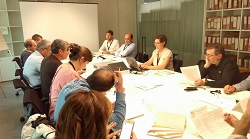
02 de November de 2016
Dinamización rural
The NRN Working Group on Mountain Areas meets
The Working Group on Mountain Areas met on November 2nd to conduct a "Study of the Economic and Social Situation of Spain's Mountain Areas and Propose Development Actions in These Areas." This working session, held at the Ministry of Agriculture, Food, and Environment (MAGRAMA), is part of the National Rural Network's activities and is included in the Action Plan for the period 2014-2020. The next meeting is scheduled for the end of January 2017.
In this second meeting, at the proposal of the Spanish Association of Mountain Municipalities (esMONTAÑA), the participants worked on 10 key points (objectives, tools, and actions) for the social, economic, and environmental development of these areas. Based on the decisions made, the participants agreed that the group's work plan will be the development of a "Guide to Good Governance for Mountain Areas," to be used by both local governments and stakeholders.
The work following this meeting will be carried out through the exchange of documents in the working group's open forum, hosted on the National Rural Network website.
The guide's introduction will address the diversity of mountain areas in Spain, their different typologies and zoning, as well as the multitude of stakeholders involved.
Some of the sections included in the "Guide to Good Governance for Mountain Areas" include: "Mountain-Adapted Administration"; "A New Local Economy, Environmentally Sustainable and Diversified," a chapter that will reflect on the added value of the uniqueness of the territory in balance with these highly sensitive systems.
During the meeting, participants discussed other chapters of the guide, such as actions and measures to "establish and attract the population," the unique sectoral characteristics of these territories, and the "Public Services, Accessibility, and Equity" chapter. The "Communal Assets, Mobilization, and Protection" chapter will address assets lost over time.
Another topic discussed was "Territorial Intelligence for Local Innovation," where they highlighted the importance of new technologies and local and social innovation. They also emphasized the importance of cultural, ethnological, and intangible values in the section on "Local Mountain Cultures and Vernacular Knowledge."
As the final chapters of the future guide, attendees will focus on "Education, Learning, and Entrepreneurship Processes for Mountain Lifestyles" and "New Models for Heritage Management," concluding with "Conclusion: 21st-Century Mountains."









